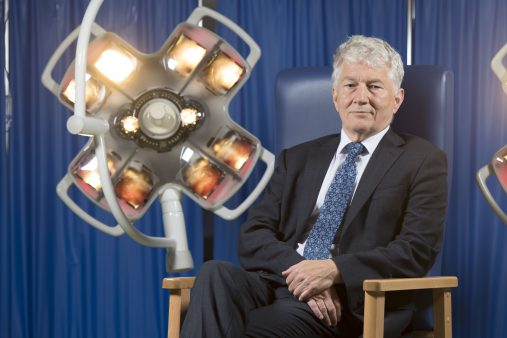My Cardiff is… light emitting molecules
14 November 2017
Professor Ian Weeks (BSc 1976, PhD 1980, DSc 2009) Acting head of Cardiff’s School of Medicine.
Ian’s passion for science and invention started early. Even in his school days, he could be found making lasers from scratch, rummaging round the back of old TV sets and mixing chemical concoctions that, for safety’s sake, should probably have been left unmixed. “I’m amazed I survived,” he says.
By his own admission, though, he was “never a scholar”, adding “I wasn’t a great fit for formal education, and achieved less than impressive qualifications.” He credits becoming an undergraduate at Cardiff University with enabling him to achieve his potential. “I attended an Open Day and immediately felt at home here. And considering my old school chemistry teacher had reported I was “unlikely to achieve much…”, I think my first class honours in Chemistry speaks volumes about the quality of the Cardiff culture of teaching and learning.”
After taking both a BSc and PhD in Chemistry, Ian left for a brief period in industry. He returned to what was then the Welsh National School of Medicine to start postdoctoral research in medical biochemistry.
“Scientists at the time were searching for better ways of measuring clinically important biomarkers. Working within the School of Medicine, I was able to apply my knowledge of chemistry to this problem. My eureka moment led to the design and synthesis of a light-emitting molecule that could be spontaneously coupled to an antibody molecule, providing the basis of a new generation of tests for disease diagnosis.”
Ian’s discovery is now used in hundreds of millions of diagnostic tests each year, including tests for cancer, diabetes, and to screen donated blood for HIV and hepatitis. His team’s work has been recognised with a Queen’s Anniversary Prize, and been included in Universities UK’s list of the ‘top 100 life-changing discoveries’.
“I am constantly amazed how a few experiments I undertook back in the 1980s created real global impact,” Ian says. “Key to this success was the faith demonstrated in my work by senior colleagues, at a time when innovation and commercialisation of research by universities was far less developed than it is today. It is testimony to the skill and expertise of the numerous people who are ultimately required to translate major innovations from bench to bedside.”
Ian has recently contributed to a collaboration between Cardiff University, Cardiff and Vale University Health Board and the global science company PerkinElmer, to develop a more reliable method for screening newborn babies for Duchenne muscular dystrophy.
“I have not yet quenched my thirst for innovation. Much of my work involves supporting the next generation of innovators as we tackle unmet clinical need, for example, in the areas of cancer, type 2 diabetes and wound healing.”
“Collaboration between academics, clinicians and industry will be the key to unlocking scientific discovery and creating tomorrow’s innovations.”
- April 2024
- March 2024
- February 2024
- January 2024
- December 2023
- November 2023
- October 2023
- September 2023
- August 2023
- July 2023
- June 2023
- May 2023
- April 2023
- March 2023
- February 2023
- January 2023
- November 2022
- October 2022
- September 2022
- August 2022
- July 2022
- June 2022
- May 2022
- April 2022
- March 2022
- February 2022
- January 2022
- December 2021
- November 2021
- October 2021
- September 2021
- August 2021
- July 2021
- June 2021
- May 2021
- April 2021
- March 2021
- February 2021
- January 2021
- December 2020
- November 2020
- October 2020
- September 2020
- August 2020
- July 2020
- June 2020
- May 2020
- April 2020
- March 2020
- January 2020
- December 2019
- November 2019
- October 2019
- September 2019
- August 2019
- July 2019
- May 2019
- April 2019
- March 2019
- February 2019
- January 2019
- December 2018
- November 2018
- October 2018
- September 2018
- August 2018
- July 2018
- June 2018
- May 2018
- April 2018
- March 2018
- February 2018
- December 2017
- November 2017
- October 2017
- September 2017
- August 2017
- July 2017
- June 2017
- May 2017
- April 2017
- March 2017
- February 2017
- January 2017
- November 2016
- October 2016
- September 2016
- July 2016
- June 2016
- May 2016
- April 2016
- March 2016
- February 2016
- January 2016
- December 2015
- November 2015
- October 2015
- September 2015
- August 2015
- January 2015
- December 2014
- November 2014
- September 2014
- August 2014
- May 2014